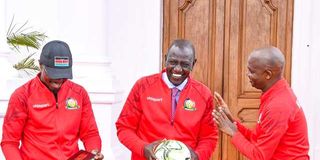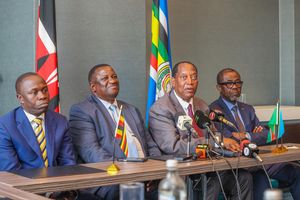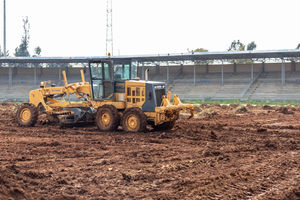
Workers at Kirigiti Stadium in Kiambu County on My 24, 2025.
President William Ruto will mark his 1,000th day in office on Monday, June 9, 2025.
Fittingly, the landmark falls on a day when the world observes International Archives Day, making it quite the occasion to reflect on his tenure.
It would have been quite something if June 9, 2025, fell on a Thursday, the day of the week that comes to life with people sharing nostalgia-inducing photos and videos on social media.
That it doesn’t, perhaps, confirms that the alignment – Ruto marking 1,000 days in office on International Archives Day – has come with its share of hits and misses.
There is also something else that comes with its share of hits, misses, and media content that induce nostalgia or regret (delete according to prejudice) when one thinks of Ruto’s 1,000 days at State House – the contribution of his administration towards the growth of sports in Kenya.
Some of those hits and misses can be plucked from the Kenya Kwanza manifesto, a 66-page document now burgeoning with unkept promises which squeeze the met targets that are saving it from full categorisation as a work of fiction.
In that manifesto, the Kenya Kwanza government dedicated a page to outlining its vision for the growth and development of sports in Kenya.
President Ruto is yet to fully hit the target on each of the six bullet points he listed as his commitment towards ensuring that sports will be adequately developed, facilitated, and funded.
In the preamble to those six commitments, the Kenya Kwanza Manifesto raised concerns about Kenyan athletes retiring to a life of poverty due to the government's failure to provide them with adequate facilities and resources during their active years.
As such, Kenya Kwanza pledged to establish a sporting heroes’ benevolent fund; however, the fund has yet to be created.
Ruto also committed to promoting county leagues and inter-county sports championships, but Talanta Hela, an initiative aimed at monetising sports talent that was launched during the tenure of Ababu Namwamba as Sports CS, came and went with the wind after the staging of the first inter-county under-19 football championships for boys and girls in 2023.

An artistic impression of the Talanta Hela Stadium that will be constructed at Jamhuri ground along Ngong Road, in Nairobi.
Subsequent Sports Secretaries, Kipchumba Murkomen and Salim Mvurya, did not revive the initiative, which was criticised for usurping the roles of sports associations.
Piggyback
Another unkept promise has been the failure of Ruto’s administration, as quoted in the Kenya Kwanza manifesto, “to leverage on our international athletics brand to develop a domestic sports apparel manufacturing cluster.”
The idea still remains on paper, as is the plan to establish and resource adequately a dedicated function within the tourism promotion function to attract international sporting events.
However, on that last point, except for continental and global sporting events that the country has a long tradition of hosting, Kenya has hosted regional and international events in cycling and tennis over the last two years that Ruto can piggyback on for delivering on that promise.
Under Ruto’s watch, Kenya secured the rights to co-host the 2025 African Nations Championships (2025 CHAN) and 2027 Africa Cup of Nations (2027 Afcon) as well as the 2025 World Taekwondo Under-21 Championships.

President William Ruto, Youth Affairs, Sports and the Arts Cabinet Secretary Ababu Namwamba and Football Kenya Federation (FKF) President Nick Mwendwa during the unveiling of the East African Community (EAC) Pamoja bid for the Africa Cup of Nations 2027 at State House, Nairobi on May 15, 2023.
In his pre-election campaigns, Ruto promised to expand the National Youth Talent Academy (NYTA) to include all sports while devolving it to the county level by introducing County Sports Talent Academies.
Implementation of this plan started to take shape in October 2024 during Murkomen’s tenure as Sports CS.
He announced a plan by the Ministry to construct 30 sports academies across the country, and the Kenya Academy of Sports later followed up on that announcement by inviting tenders for the construction of 37 pilot sports academies across 24 counties.
Low-hanging fruits
Further, Murkomen stated that the Kenya Kwanza administration plans to construct such academies in each of the country’s 290 constituencies by 2027.
The government set aside Sh1.7 billion for the project, and prospective entrepreneurs were given until December 2, 2024, to submit their tenders.
Implementation of this project is ongoing, and current Sports CS Salim Mvurya recently presided over the groundbreaking of the Webuye West Constituency Sports Academy in Bungoma County, the seventh such project whose construction has started.
Another promise was the establishment of a high-level expert taskforce to identify sustainable sources of sports funding within the administration’s first 100 days, the magical timeframe ambitious governments give themselves to pick low-hanging fruits.
However, this took 156 days to implement, with Ruto appointing the presidential taskforce on the establishment of the national lottery on February 16, 2023, slightly over two months after assenting to the National Lottery Bill (2023) on December 11, 2022.
That 25-member taskforce, comprising a steering committee chaired by industrialist Narendra Raval and a technical committee led by Dr Linda Musumba, was given a term of three months but there is no record of them submitting their findings on their seven terms of reference.
That first promise was also stuffed with three other ideas that Kenya Kwanza highlighted as key to unlocking sustainable sources of sports funding – tax incentives for corporates sponsoring sports, a dedicated or ring-fenced tax for sports funding, and initiation of a public-private partnership framework for funding development of sports infrastructure.
Tracking the progress on the implementation of those three ideas, blended with noting the administrative changes that have taken place in the executive arm of government during Ruto’s tenure, owing to the 2024 anti-government protests, and the impeachment of Deputy President Rigathi Gachagua.
The task of implementing the findings fell on the shoulders of the three CSs who have handled the docket, but Ruto’s refusal to assent to the 2024 Finance Bill denied Ababu Namwamba credit for seeing through the factoring in of tax incentives for corporates sponsoring sports in the widely-rejected document.
Sports Fund
Later in September 2024, Murkomen made a proposal for a review of the country’s sports policy to allow for public-private partnerships that were intended to pave the way for the private sector to construct and own stadiums locally.
But there has been no progress on the matter since then, with county governments and the government, through Sports Kenya, continuing to undertake funding of the development of sports infrastructure in the country.
In May 2025, CS Mvurya revisited the plan to ring-fence the Sports Fund so that money collected through the fund is not diverted for funding government expenses and projects that are not related to sports.
To implement the plan, Mvurya proposed a review of the Sports Act, a proposal that goes back to another promise outlined in the Kenya Kwanza manifesto that is yet to be actualised.
As far as hits and misses go, President Ruto would have celebrated a massive achievement of his regime in February had the country, together with Tanzania and Uganda, hosted 2025 CHAN as scheduled.
That would have meant that the renovation of Kasarani and Nyayo stadiums would have been completed on time, but that was not the case. Construction work on those two stadiums continues, with doubts lingering on whether Nyayo National Stadium will be ready for the tournament’s rescheduled August kick-off.
With Kenya falling behind all deadlines to get Kasarani and Nyayo stadiums ready for hosting of 2025 CHAN in February this year, concerns were raised about Ruto’s commitment to the development of sports infrastructure in Kenya.
These concerns were compounded by slow work on the construction of other stadiums across the country, such as Kipchoge Keino in Eldoret and Kirigiti Stadium in Kiambu.

Workers at Kirigiti Stadium in Kiambu County on My 24, 2025.
Not forgetting other stadiums which have microphones built but remain invisible to the camera – the historic Kamariny Stadium in Elgeyo Marakwet County, among others in Chuka, Moyale, Nyeri, and Wote.
Perhaps, these are fears that can be allayed if the Kenya Defence Forces, an audit-immune institution that is now the government’s trusted project manager, ensures the timely completion of the construction of the Talanta Stadium, a 60 000-capacity sports venue that is sprouting along Ngong Road at Jamhuri as a concrete cauldron with green shade netting.
Prayers
Talanta Stadium is expected to cost Sh44 billion, which translates to $345 million, making it one of Africa’s most expensive stadiums upon completion. Cote d’Ivoire’s Alassane Ouattara Stadium, also a 60,000-seater sports cathedral, was constructed at $257 million (Sh33.2 billion) and hosted the final of AFCON 2023.
The Diamniadio Olympic Stadium in Senegal, which seats 50,000 ppeople, cost almost as much at $270 million (Sh34.8 billion). Rwanda’s upgrading of Amahoro Stadium to a 45,000-capacity venue cost $170 million (Sh21.9 billion).
Even as work continues day and night to complete what would be the jewel of Ruto’s legacy for the sports sector in Kenya, there is a lot that has happened during his 1,000 days in office that has given sports fans and stakeholders sleepless nights.
The delayed completion of Kasarani and Nyayo saw Harambee Stars stage its home matches in foreign countries, despite Namwamba giving a firm promise that such would never happen under his and Ruto’s leadership.
The national Kabaddi team’s travel fiasco of September 2024, and Kenya men’s basketball team, Morans, giving a walkover after arriving late for their AfroBasket tournament in Tunisia in February 2025, are incidents that raised concerns on the priority the Ministry of Sports gives to the management of the travel and logistics of some national teams.
Kenya’s Olympian fencer, Alexandra Ndolo, has also frequently documented her frustrations with the Kenya Fencing Federation over funding for her competitions and has consistently urged the Ministry of Sports to take its oversight role of sports federations seriously, but to no avail.
In March 2023, athletes threatened to boycott the 2023 Africa Games trials after Athletics Kenya stated that only one athlete would be selected per event due to funding challenges.
Later, in April 2023, there was uproar in the sports fraternity when the Ministry of Sports stated that only sports that carry potential economic value to the country will be funded, as the ministry was operating on a shoestring budget.
In June 2023, as Faith Kipyegon’s daughter turned State House into her playground during a ceremony to fete the three-time Olympic 1,500 metres champion for breaking two world records, and sprinter Ferdinand Omanyala requested President Ruto to repair the running track at Kasarani Annex, which was worn out.
Still, the country’s athletes continue to suffer from a lack of enough facilities with World Athletics-standard running tracks.
Last month, organisers of the 2025 Kip Keino Classic were in a race against time to get the Ulinzi Sports Complex ready to host the event on May 31 because the tartan track at Nyayo National Stadium could not be laid on time for the competition.
Under Ruto’s tenure, the country has also grappled with rising cases of gender-based violence (GBV), which have not spared sportspeople, particularly female athletes.
The sports fraternity is still hoping for a clear strategy to tackle GBV in the industry, with the families of Agnes Tirop, Damaris Mutua, and Edith Muthoni still seeking justice as the murder cases ongoing.
Notably, in April, the family of Agnes Tirop wrote to President Ruto and the Inspector General of the National Police Service, Douglas Kanja, asking for the arrest of Ibrahim Rotich, the main suspect in Tirop’s murder.
Tirop’s family expressed fears that Rotich being out on bond is a threat to their security, as they have already testified against him.
While Ruto established a 42-member technical working group to combat GBV in January, the task force's mandate lapsed in April and had their term extended by two more months, meaning a report on their findings can only be submitted in June.
Other challenges that sports stakeholders hope the government provides a clear strategy on is tackling the rising cases of match-fixing in football, a vice that has seen no suspect charged and prosecuted over it because the country lacks the law to combat it.
Still, even with Ruto’s administration struggling to meet its promises made in the manifesto regarding the growth and development in Kenya, there have been bright moments.
Kenya, together with Tanzania and Uganda, won the bid to host the 2027 Afcon.
World football governing body Fifa also lifted its suspension of FKF, and in 2024, the Junior Starlets, the national women’s Under-17 football team, became the first team of any age category and gender to qualify for and feature at a FIFA World Cup.
In 2025, the Rising Stars featured at the Under-20 Afcon after a 46-year hiatus.
Kenyan athletes have continued to win medals and set world records in track and road races while Kenya Sevens bounced back from relegation to return to the HSBC Sevens Series.
Last month, the Nairobi City Thunder took Kenyan basketball by storm and became the first Kenyan team to feature at the Basketball Africa League (BAL).
Through it all, Ruto proved his pedigree as a sportsman. He had a kick-about at State House with the Junior Starlets and scored penalties against Ababu Namwamba, Kimani Ichungwa’h, and Gladys Wanga, but football fans still hope his administration can sort out the match-fixing mess in Kenyan football.
He proved he can do at least five pushups, and he is fast enough to win a 50-metre race in sweltering heat in Mombasa. Hopefully, he will soon launch running tracks countrywide.
And, when former Bayern Munich and Manchester United midfielder, the German Bastian Schweinsteiger, toured the country with the UEFA Champions League in May, Ruto had his moment with the Big Ears and said a prayer for his beloved Arsenal to lift on May 31.
God did not answer that prayer, but we hope he listens to his prayers for the growth and development of Kenyan Sports.
See some of our other Ruto@1,000 coverage below:






